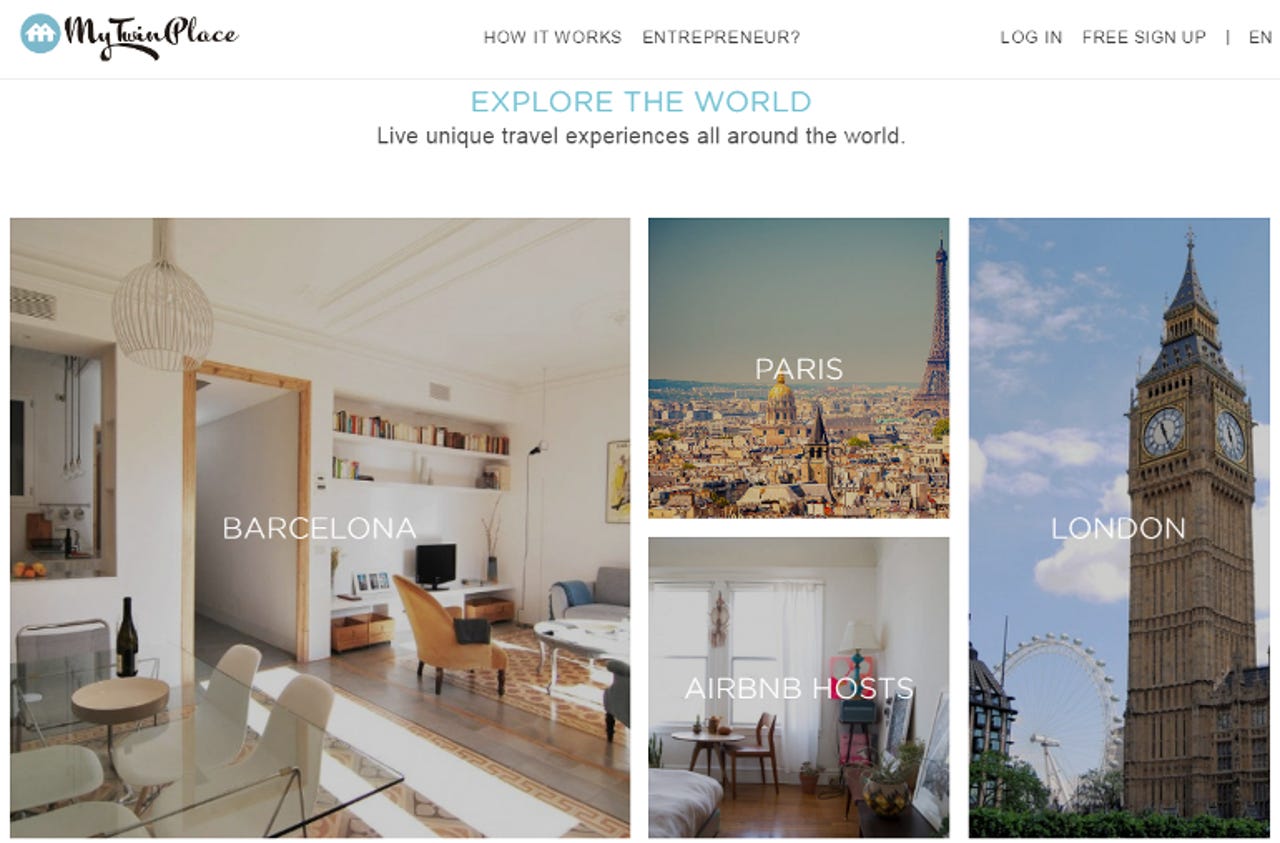How MyTwinPlace plans to open the door to new form of home swap

Home exchanges can take a lot of organizing. MyTwinPlace promises to make the process easy and affordable.
MyTwinPlace founders Jean-Noël Saunier and Xavier Laballós do exactly what their home-sharing portal proposes: they let strangers stay in their homes for free.
Their site, which has just raised €750,000 ($840,000) in venture-capital funding, works on a points-based system.
By filling in a profile, you secure your first points, which you can use on staying in another community member's home, say, in a city overseas, such as Paris or Madrid.
Then to generate more points, you have to put up some other MyTwinPlace users in your home in return.
Saunier and Laballós plan to use the new investment to expand the business. The latest funding comes from Sabadell Venture Capital, Spanish early-stage venture-capital company Inveready, and several business angels, including Vincent Rosso, cofounder of BlaBlaCar.
Madrid-based French entrepreneur Saunier, who has worked at cloud and content-delivery firm Akamai and media-framework specialist Fluendo, says the aim is to use the money to strengthen MyTwinPlace's presence in countries where it is already strong, such as Spain, Italy, the US, the UK.
"[We want to] get a wider range of destinations and achieve strategic alliances to add value to the traveler," he says.
Saunier and Laballós started MyTwinPlace in 2013, when Laballós' partner was expecting twins. The name of the company is related to that event, which changed his life drastically.
At that time, they were considering a typical home-swap project, which probably would have involved a home-exchange platform that enabled tourists to save up to 50 percent in travel costs while having a more local experience of the places they were visiting.
The problem was that such a scheme needs reciprocity. Users who wanted to go to Paris or New York had to find someone who would like to stay in, say, Barcelona, at the same time. That issue was seen as a major potential barrier to developing the project.
Home exchanges can take a lot of organizing. Laballós reckons he sent more than 1,000 emails in his first home-exchange experience. The other obstacle to be overcome is confidence. After all, with home-exchanges, you're letting strangers share your privacy to some degree.
MyTwinPlace founders Xavier Laballós and Jean-Noël Saunier: Giving the community a wider range of destinations.
So, in 2015, the two entrepreneurs decided to give the business a new twist and created the current system based on points, eliminating the need for reciprocal home exchanges.
The profile information provided initially by users is evaluated, with the accommodation rated on its rentable value, which forms the basis on which the points are awarded.
The hosting process is covered by insurance to allay any user fears and encourage people to participate. Although the accommodation is free, you pay the platform for intermediation. The fee is €10 ($11.20) per night.
According to Laballós, creating a platform to accomplish those transactions has been a big technological challenge for the MyTwinPlace development team because it uses pattern recognition and 'intelligent booking' to make perfect matches.
"It's not been a cakewalk. Our users wear two hats. They're both travelers and hosts, and their behavior is different in each case," says Laballós, who is a telecoms engineer with more than 10 years' experience in new media.
One development that took a lot of work is the one-click feature that lets users import data from services such as Airbnb, Homeaway, and Flipkey, and synchronizes calendars to make the most of the times when homes are empty.
In early 2016, with the support of Telefónica Open Future and its European initiative OpenAxel, the startup also launched a MyTwinPlace version specifically for entrepreneurs to share their homes.
Read this
"What we do is solve a housing market inefficiency without anyone having to pay for it. If you belong to the community, you can enjoy other people's houses in exchange for making yours available to the community. You don't need money, but share what you already have," Laballós says.
Saunier adds: "When you remove money transactions, you talk to your hosts as equals, and that brings a positive circle of relationships."
Now, the platform has over 40,000 members, who saved up to €1m in 2015, he says: "Moneyless exchange is the next challenge for the sharing economy."
Ignacio Fonts, managing partner at MyTwinPlace investor Inveready, echoes this idea: "Creating a virtual currency that allows travel without paying accommodation costs will be a catalyst for the sharing economy, beyond the vacation rental field."
Xavier Gásquez, director of Venture Capital projects at Banc de Sabadell, values MyTwinPlace's "innovative approach", but adds that the most important asset of the company is its team of 12 people, as well as a diversified portfolio.
"Our expected return on these kind of investments is financial profitability, with cash-to-cash returns in double digits. But it's also to position Banc de Sabadell further as a player in the venture sector in Spain," he says.
According to MyTwinPlace investor Vincent Rosso, the home sharing market is expected to account for one billion nights of accommodation by 2025.
